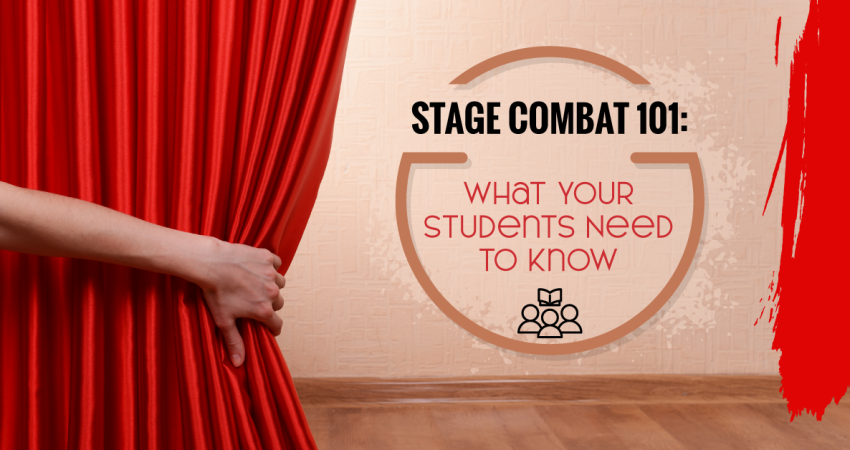This month, we dive into the world of stage fighting. If you dream of directing an action packed show like The three Musketeers, Robin Hoodor Treasure Island, then you’ll have to deal with stage fights with your students. But stage combat is more than sword and gun fights. There are a lot of plays and musicals that include many different types of stage fights: punches, slaps, hair pulling, slow motion fights, knife fights, found gun fights, slides, falls, lifts and more others. Wait – do falls and lifts count and stage fights? Categorical!
The mere mention of fighting on stage can evoke many feelings in student performers: excitement, nervousness, silliness, or even fear. If you are planning to conduct a stage combat workshop with your students, or if you are performing even the briefest moments of stage combat, you need to ensure that the student performers feel confident and safe physically and mentally at all times. . Here are some things your students need to know before starting the stage combat activity:
1. Students must know the responsibilities involved in conducting stage combat.
We go into this in detail in our article Stage Combat 101: Before You Begin. Be sure to check out the gift, which has a great printable tip sheet for students. Highlights include:
- The first rule of stage fighting is safety first, safety last and safety always.
- The stage fight must always be executed exactly as it is choreographed every time. Never improvise a fight on stage.
- Stage weapons can be broken or damaged or cause personal injury through improper handling. Always treat stage guns with care and respect.
- If a student is caught fooling around during stage combat instructions or with a stage weapon, they will face consequences (such as being removed from combat entirely).
In short, students must show respect, care, maturity and trust to be allowed to participate in stage fights. If a teacher, director or fight director does not feel that a student has shown the necessary traits to do stage fighting, the student will not be assigned to a role involving stage fighting or will not be allowed to attend fight workshops on the scene.
2. Students must be informed.
In audition announcements, be sure to include whether a role involves stage combat and what type of combat (unarmed, knife, sword, etc.) will be performed. Have copies of the script available ahead of time so students can read it and see exactly what the role entails, such as whether the character is the aggressor or the victim and how much fighting is involved. That way, students can make informed choices about whether they feel physically capable and mentally comfortable auditioning for a role that requires fighting on stage.
Note: This is also a useful technique for any role involving romance or sensitive subjects such as death.
It’s also a good idea to let students know in advance if you plan to do a stage combat workshop or classroom unit. Not only will they be able to prepare in advance so they are dressed appropriately (sneakers, workout clothes, long hair tied back, etc.), they can make an informed decision about whether they feel comfortable participating.
3. Students need to know that they can support themselves.
If a principal or fight director asks a student to do something that the student knows they cannot physically do or feels unsafe about, the student is allowed to speak up and inform the director/fight director (either publicly , or private, depending on the student’s need). choice). Let’s say your director wants a student to kneel on stage, and the student has had a previous knee injury. The student can certainly ask not to do the move, or do an alternate move, or ask to wear a pair of knee pads. In short, if something feels unsafe, don’t do it!
Students do not have to explain the reason or reveal past history or trauma when requesting not to do a move they feel is unsafe. A good fight director will find a move or workaround. Be aware that a student may feel comfortable during the audition or early rehearsal process, then discover when a particular movement or sequence is uncomfortable for them. We encourage teachers and fight directors to be flexible and understanding if these situations arise.
Click here for a free printable student worksheet.
Kerry Hishon is a director, actor, writer and stage fighter from London, Ontario, Canada. She blogs at www.kerryhishon.com.
Want to learn more about our newest pieces, resources, and giveaways?
Get on our list!

